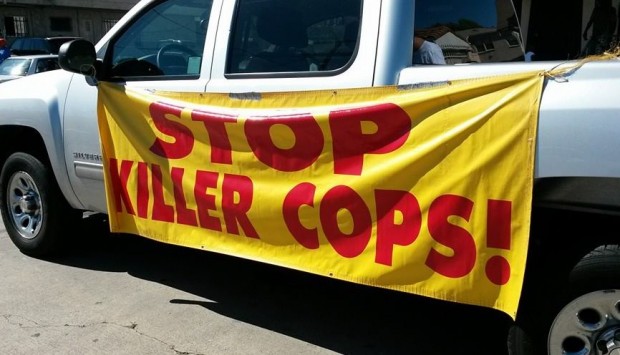 Back in 1999, radio show host Sean Hannity, who was not yet syndicated across the country at this point, was a lot less guarded, and at the time was palling around with Hal Turner, said on his radio program that hate crime laws were “laws against conservatives”. That has always a pretty telling thing about where the right-wing in this country have been at, especially with the election of a black man as president. Well, in the same week that we have seen two right-wingers from overseas, Geert Wilders and David Irving, bounce around the country attacking Muslims and Jews, that black man sent a few shots across the bow of those that support crap like theirs. President Barack Obama signed a “law against conservatives” this week, which expanded the 1969 federal hate crimes law to include those who are attacked because of sexual orientation, disability and gender identity – not just gender, but by what gender a person identifies themselves as. But he didn’t stop there. By week’s end, he also lifted the 22-year-old ban against those who are HIV positive from entering the country. Now people can come here to get treatment, adopt children and come to conferences about AIDS awareness without being detained at the airport because AZT is found in their luggage (Google Hans Paul Verhoef). Again, these were shots across the bow. We are not just calling conservatives on their hatemongering, we are doing something about it – and them. If they keep up much of the temper tantrum, tea party BS they have engaged in much of this past year, eventually those shots across the bow will become much more than that, and we will blow them out of the water.
Back in 1999, radio show host Sean Hannity, who was not yet syndicated across the country at this point, was a lot less guarded, and at the time was palling around with Hal Turner, said on his radio program that hate crime laws were “laws against conservatives”. That has always a pretty telling thing about where the right-wing in this country have been at, especially with the election of a black man as president. Well, in the same week that we have seen two right-wingers from overseas, Geert Wilders and David Irving, bounce around the country attacking Muslims and Jews, that black man sent a few shots across the bow of those that support crap like theirs. President Barack Obama signed a “law against conservatives” this week, which expanded the 1969 federal hate crimes law to include those who are attacked because of sexual orientation, disability and gender identity – not just gender, but by what gender a person identifies themselves as. But he didn’t stop there. By week’s end, he also lifted the 22-year-old ban against those who are HIV positive from entering the country. Now people can come here to get treatment, adopt children and come to conferences about AIDS awareness without being detained at the airport because AZT is found in their luggage (Google Hans Paul Verhoef). Again, these were shots across the bow. We are not just calling conservatives on their hatemongering, we are doing something about it – and them. If they keep up much of the temper tantrum, tea party BS they have engaged in much of this past year, eventually those shots across the bow will become much more than that, and we will blow them out of the water.
President Obama Signs Hate Crimes Bill Into Law
Mexican American Legal Defense & Education Fund (MALDEF)
WASHINGTON, D.C. – Yesterday, President Barack Obama signed the Matthew Shepard and James Byrd, Jr. Hate Crimes Prevention Act into law. The Act expands coverage of the 1969 federal hate crimes law to include victims targeted based on their sexual orientation, disability, and gender identity. The Act further grants federal officials greater authority to investigate and prosecute hate crimes, provides greater funding for state and local agencies to investigate hate crimes, and for the first time, allows hate crimes prosecution without requiring proof that the victim was attacked because he or she was engaged in a federally protected activity.
“The Shepard and Byrd Act is a much-needed step to deter the alarming rise in hate-motivated violence that is increasingly targeted at Latinos. This law will help to bring a measure of justice to victims and their families and deter or prevent the commission of these heinous crimes,” noted Thomas A. Saenz, MALDEF President and General Counsel.
The bill was first introduced in 1999, a year after Mathew Shepard, a gay teenager from Wyoming, was beaten to death due to his sexual orientation, and James Byrd, Jr., a black man from Texas, was tied to a pick-up truck and dragged to death because of his race. The hate crimes bill languished in Congress for ten years, unable to gain enough support for its passage. However, a string of hate crimes committed against Latinos last year prompted renewed urgency of the need for its passage.
Among the Latino victims were 25-year old Luis Ramirez, who lost his life after he was murdered by a group of Shenandoah, Pennsylvania teenagers who yelled racial epithets as they brutally beat him in July, 2008. A few months later, in November, 2008, Marcelo Lucero died of seven stab wounds to the chest inflicted by a group of teenagers in Patchogue, New York, who had set out to attack Latinos. Only one month later, Jose Osvaldo Sucuzhañay was beaten into a coma in Brooklyn, New York by a group of men yelling anti-Latino and anti-gay epithets. He died from his wounds within five days of the attack.
In response to these slayings, MALDEF spearheaded a nationwide campaign to bring public attention to the 40 percent rise in hate crimes against Latinos, urge greater involvement by the Department of Justice, and garner Congressional support for passage of the hate crimes bill. In June, 2009, 50,000 people from around the country joined MALDEF’s call by signing an anti-hate crimes petition which MALDEF delivered to the Department of Justice. MALDEF was also a member of the Anti-Defamation League’s and the Leadership Conference of Civil Rights’ hate crime task force and worked closely with other leading national organizations to vigorously advocate for the strengthening of federal anti-hate crimes law.
“Hate crimes not only tragically impact their victims; they also render all members of the targeted groups more vulnerable to discrimination and attacks,” said Claudine Karasik, MALDEF Legislative Staff Attorney. “This new law now allows for broader federal involvement and prosecutions when state and local authorities are unable or unwilling to act, or when local prosecutions fail to vindicate a victim’s rights and society’s interest in eradicating bias-motivated crimes.”
The families of victims, many lawmakers, law enforcement entities, lawyers, community groups, and thousands of concerned citizens worked diligently over recent years to effect this change in the law. MALDEF is proud to stand among such partners.
HIV Travel Ban Lifted By President Obama
Huffington Post
WASHINGTON — President Barack Obama said Friday the U.S. will overturn a 22-year-old travel and immigration ban against people with HIV early next year.
The order will be finalized on Monday, Obama said, completing a process begun during the Bush administration.
The U.S. has been among a dozen countries that bar entry to travelers with visas or anyone seeking a green card based on their HIV status.
“If we want to be the global leader in combatting HIV/AIDS, we need to act like it,” Obama said at the White House before signing a bill to extend the Ryan White HIV/AIDS program. Begun in 1990, the program provides medical care, medication and support services to about half a million people, most of them low-income.
The bill is named for an Indiana teenager who contracted AIDS through a blood transfusion at age 13. White went on to fight AIDS-related discrimination against him and others like him and help educate the country about the disease. He died in April 1990 at the age of 18.
His mother, Jeanne White-Ginder, attended the signing ceremony, as did several members of Congress and HIV/AIDS activists.
In 1987, at a time of widespread fear and ignorance about HIV, the Department of Health and Human Services added the disease to the list of communicable diseases that disqualified a person from entering the U.S.
The department tried in 1991 to reverse its decision but was opposed by Congress, which went the other way two years later and made HIV infection the only medical condition explicitly listed under immigration law as grounds for inadmissibility to the U.S.
The law effectively has kept out thousands of students, tourists and refugees and has complicated the adoption of children with HIV. No major international AIDS conference has been held in the U.S. since 1993, because HIV-positive activists and researchers cannot enter the country.
Obama said that by lifting the ban, the U.S. will take a step toward ending the stigma against people with HIV/AIDS, something he said has stopped people from getting tested and has helped spread the disease. More than 1 million people live with HIV/AIDS in the U.S., and more than 56,000 new infections are reported every year.
Obama noted his own effort several years ago to help combat the stigma. During a 2006 vis
it to Kenya, his father’s native country, then-Sen. Obama and his wife, Michelle, publicly took an HIV/AIDS test.
The 11 other countries that ban HIV-positive travelers and immigrants are: Armenia, Brunei, Iraq, Libya, Moldova, Oman, Qatar, Russia, Saudi Arabia, South Korea and Sudan, according to the advocacy group Immigration Equality.
Several such groups welcomed Obama’s announcement.
Rachel B. Tiven, executive director of Immigration Equality, said the ban pointlessly has barred people from the U.S. and separated families with no benefit to public health.
“Now, those families can be reunited, and the United States can put its mouth where its money is: ending the stigma that perpetuates HIV transmission, supporting science and welcoming those who seek to build a life in this country,” said Tiven, whose organization works for fairness in immigration for gay, lesbian, bisexual, transgender and HIV-positive people.


More Stories
PHILADELPHIA GREENS APPLAUD RECENT DECISION IN MUMIA'S CASE; STILL PUSHES FOR NEW TRIAL
AT LONG LAST, ARIZONA STATE SENATOR RUSSELL PEARCE IS OUT!
ARIZONA: 'MAKE NO MISTAKE ABOUT IT…RUSSELL PEARCE HAS BEEN RECALLED!'